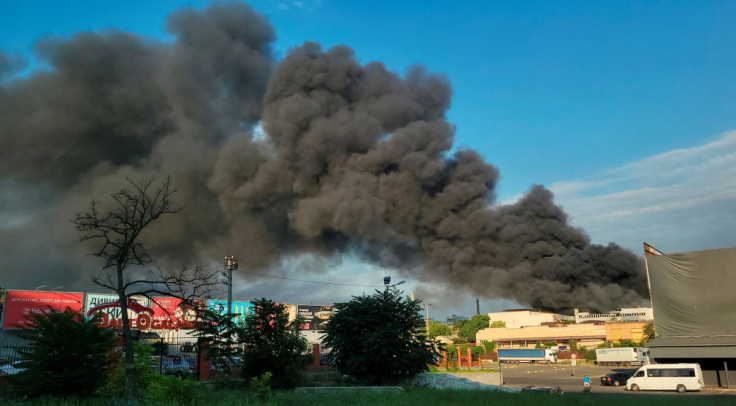Ukraine Works To Resume Grain Exports Despite Russian Strike On Odesa

Ukraine pressed ahead on Sunday with efforts to restart grain exports from its Black Sea ports under a deal aimed at easing global food shortages but warned deliveries would suffer if Russia's strike on Odesa was a sign of more to come.
President Volodymyr Zelenskiy denounced Saturday's attack as "barbarism" that showed Moscow could not be trusted to implement a deal struck just one day earlier with Turkish and United Nations mediation.
Public broadcaster Suspilne quoted the Ukrainian military as saying after the strike that the missiles did not hit the port's grain storage area or cause significant damage and Kyiv said preparations to resume grain shipments were ongoing.
"We continue technical preparations for the launch of exports of agricultural products from our ports," Infrastructure Minister Oleksandr Kubrakov said in a Facebook post on Saturday.
Russia said on Sunday its forces had hit a Ukrainian warship and a weapons store in Odesa with missiles.
The deal signed by Moscow and Kyiv on Friday was hailed as a diplomatic breakthrough that would help curb soaring global food prices, with U.N. officials saying it could restore Ukrainian grain shipments to pre-war levels of 5 million tonnes a month.
But Zelenskiy's economic advisor warned on Sunday the strike on Odesa signalled that could be out of reach.
"Yesterday's strike indicates that it will definitely not work like that," Oleh Ustenko told Ukranian television.
He said Ukraine did have the capacity to export 60 million tonnes of grain over the next nine months, but it would take up to 24 months if its ports could not function properly.
WAR ENTERS SIXTH MONTH
As the war entered its sixth month on Sunday there was no sign of a let-up in the fighting.
The Ukrainian military reported Russian shelling in the north, south and east, and again referred to Russian operations paving the way for an assault on Bakhmut in the eastern Donbas region.
Intensified Russian shelling prompted the mayor of Kharkiv to urge residents of Ukraine's second-largest city to avoid, if possible, ground transportation.
"The last week has shown that the aggressor doesn't even pretend to be firing at military targets anymore," Ihor Terekhov wrote on Telegram on Sunday. "Use the metro system more often- as of today it is the safest way to get around."
Ukraine's air force command said its forces had shot down early on Sunday three Russian Kalibr cruise missiles fired from the Black Sea and aimed at the western Khmelnytskiy region.
While the main theatre of combat has been the Donbas, Zelenskiy said in video on Saturday that Ukrainian forces were moving "step by step" into the occupied eastern Black Sea region of Kherson.
The strikes on Odesa drew condemnation from the United Nations, the European Union, the United States, Britain, Germany and Italy.
Russian news agencies quoted Russia's defence ministry as saying that an Ukrainian warship and U.S. supplied anti-ship missiles were destroyed.
"A docked Ukrainian warship and a warehouse with U.S.-supplied Harpoon anti-ship missiles were destroyed by long-range precision-guided naval missiles in Odesa seaport on the territory of a ship repair plant," it said.
On Saturday, Turkey's defence minister said Russian officials told Ankara that Moscow had "nothing to do" with the strikes.
According to the Ukrainian military, two Kalibr missiles fired from Russian warships hit the area of a pumping station at the port and two others were shot down by air defence forces.
SAFE PASSAGE
The strikes appeared to violate Friday's deal, which would allow safe passage in and out of Ukrainian ports.
Ukraine and Russia are leading global wheat exporters and a blockade of Ukrainian ports by Russia's Black Sea fleet since Moscow's Feb. 24 invasion has trapped tens of millions of tonnes of grain, worsening global supply chain bottlenecks.
Along with Western sanctions on Russia, it has stoked food and energy price inflation, driving some 47 million people into "acute hunger," according to the World Food Programme.
Moscow denies responsibility for the food crisis, blaming the sanctions for slowing its food and fertiliser exports and Ukraine for mining the approaches to its ports.
Ukraine has mined waters near its ports as part of its war defences but under Friday's deal pilots will guide ships along safe channels.
A Joint Coordination Center staffed by members of the four parties to the agreement are to monitor ships passing the Black Sea to Turkey's Bosporus Strait and on to world markets. All sides agreed on Friday there would be no attacks on them.
Putin calls the war a "special military operation" aimed at demilitarising Ukraine and rooting out dangerous nationalists. Kyiv and the West call this a baseless pretext for an aggressive land grab.
© Copyright Thomson Reuters 2024. All rights reserved.





















